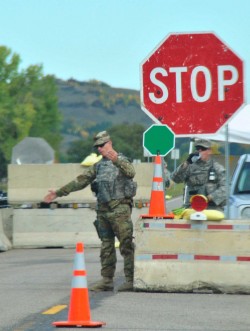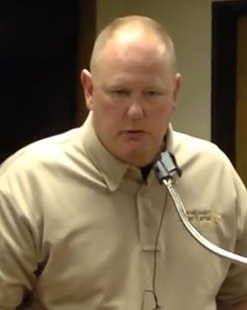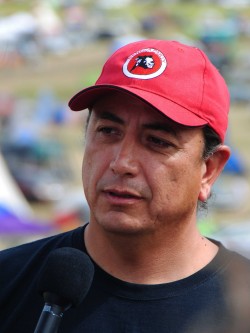News | September 22nd, 2016

By C. S. Hagen
cshagen@gmail.com
MANDAN, N.D. – Two North Dakotan chiefs are pitted one against the other.
One chief, Morton County Sheriff Kyle Kirchmeier, has laws, politicians, the North Dakota National Guard, taxpayers’ money, and a third chief from the private sector, Kelcy Warren, CEO of Energy Transfer Partners, with all the powers money can buy, on his side.
The other, Standing Rock Sioux Tribe Chairman Dave Archambault II, uses prayer, donations, federal treaties, thousands of volunteers from native tribes and concerned citizens across the world to fight the pipeline’s continuation.
One chief uses the law’s full force: police in riot gear, automatic weapons, handcuffs -- and calls the Dakota Access Pipeline demonstrations, which have continued in earnest and unabated since early August, dangerous.

The other chief calls for prayer, civil disobedience, smokes a ceremonial peace pipe, and calls his people, including those from nearly 300 different tribes, water protectors.
One chief lives in Mandan, making USD 78,000 a year; the other sometimes resides in a canvas tipi on land that once belonged to the Great Sioux Nation.
One chief arrested the other. Archambault was among the first activists to be arrested on August 12, 2016, according to the Morton County Sheriff’s Department.
But to Archambault, the fight against Dakota Access Pipeline is just. “Our tribe has opposed the Dakota Access pipeline since we first learned about it in 2014,” Archambault said in a press conference. “I believe this movement is organic, and has a life on its own. It is not about race, not about hate. It’s about unity.”
For 500 years, Archambault said, Native Americans have suffered from defeat, prejudice, and broken treaties. One day, the pipeline will not only poison the Standing Rock Sioux tribe, but the millions who depend on the Missouri River for water – human, fauna, and flora.
“And yet we’re the ones who continue to pay the costs,” Archambault said.
The costs include but are not limited to the pipeline tearing up native burial sites and poisoning land and waters on its journey south toward Nederland, Texas -- in the same state where the third chief resides in a 23,000-square-foot home on 10 acres of land.
There are the costs to the personal freedoms of at least 69 activists arrested, some of whom are banned from returning to protest areas. Misdemeanor offenses of trespassing are now becoming felony charges of criminal mischief, according to the Morton County Sheriff’s Department. Some of those arrested, activists said, are being stalled, and temporarily denied their rights to counsel.
“The biggest concern that we had about those situations, was holding someone on a no-bond hold for three days on a misdemeanor, that seems irrational,” Standing Rock Sioux Tribe camp attorney Angela Bibens said. “The situation is that people are being targeted, people’s relatives are being targeted. Are people’s rights being violated? There is definitely a case for that.”
Sara Long, a citizen journalist, was arrested for trespassing on Sunday. She had her phone confiscated, was abused verbally, and law enforcement threatened to have her phone unlocked with software, Bibens said.
“You have to have a warrant to get into someone’s phone,” Bibens said. “That is a clear case of someone’s rights being violated. All charges against Long were eventually dropped, and Long did receive her cellular phone back, Bibens said.
“People are being arrested indiscriminately. They are trying to target leadership, trying to determine who is in charge. There is a certain amount of panic that is detectable within law enforcement. They’re not accustomed to what they’re seeing, a large, peaceful group of Native Americans – everybody’s here in Standing Rock.”
Bibens was denied one-on-one access to activists in the county jail, she said, and has to speak to them through glass and by telephones, which may be recorded, she said. Licensed to practice in Colorado, and currently with the National Lawyers Guild, it is legal for out-of-state attorneys to be denied the right to practice in another state, but the current situation with 69 arrests is overwhelming, not only for her, but for Morton County.
Some are being appointed court attorneys, and she is attempting to recruit local lawyers to step in.
Additionally, activists have reported seeing military research and surveillance drones, claiming the drones have blocked reception to the Standing Rock camp areas, and that Facebook is blocking some activists’ videos and statements. Bibens is monitoring the claims, she said.
Not long after the Standing Rock Sioux Tribe’s petition for an injunction against Dakota Access failed, President Obama’s Administration and the U.S. Army Corps of Engineers issued a statement recommending Dakota Access LLC be no longer authorized to work on the U.S. Corps of Engineers’ lands.
On Friday, the Washington D.C. Circuit Court of Appeals officially backed the President’s recommendation, halting all work on the Dakota Access Pipeline within 20 miles on either side of Lake Oahe along the Missouri River.
The news was joyous to some, considered an annoyance to others. With a legal score of one to one for both chiefs, some expected the tension – like a ticking time bomb – would be defused.

Instead, tensions grew.
Law enforcement began arresting activists, native spokespeople, and media personnel, by the busloads. Misdemeanor criminal trespass charges have been filed against Democracy Now! host Amy Goodman, the Standing Rock Sioux Tribe’s Red Warrior spokesman Cody Hall, at least two other journalists, and third-party presidential candidate Dr. Jill Stein, as well as her running mate, Ajamu Baraka.
“The Morton County State’s Attorney’s office will pursue felony charges against the protesters who attached themselves to equipment due to the seriousness of the crime,” Kirchmeier said. “The Dakota Access Pipeline has shown good faith in the legal process by removing their equipment from their worksites… But rather than respect this, a small element of the protest group has decided to go and find DAPL equipment and sites wherever they are and interrupt their work that the pipeline has legal right to conduct.”
“This is an unacceptable violation of freedom of the press,” Amy Goodman said in a statement. “I was doing my job by covering pipeline guards unleashing dogs and pepper spray on Native American protesters.”
Citizen journalist Sara Long, a resident of Cannon Ball, said on her Facebook page that she was incarcerated for 28 hours and charged with criminal trespass.
“They are trying to silence us, again and again, by violating our rights,” Long said on her Facebook page.
“It was not known at the time that Ms. Goodman was a media representative,” Kirchmeier said. “Part of the investigation process is to review all evidence. This included video taken from the protest site. Persons identified on the video were arrested.”
All activists arrested, excluding one female prisoner who had an outstanding warrant from Nebraska, have been released on bail, Kirchmeier reported. Olowan Sara Martinez was charged with criminal trespass on a Dakota Access Pipeline worksite, and has outstanding warrants of terroristic threats, a class-4 felony, among other misdemeanor charges from Nebraska. Nebraska officials have 10 days to take custody of Martinez, according to Morton County Sheriff’s Department.
“There are numerous outside groups, some invited and some not,” Kirchmeier said. “They are participating and are suspected to be causing issues. While they may have come in support of the Standing Rock Sioux Tribe, they are also pushing their own agenda.”
Many activists feel local and state law enforcement, and now the North Dakota National Guard, are acting as the protectors of big oil interests. While native interests rarely make national or international headlines, and their opinions on matters are rarely heard, these ingredients add to the distrust shared by nearly all Native Americans toward the federal and local governments, activists said. Throw in a pinch of big oil campaign funding for North Dakota politicians, a little private investing, and the final result resembles an agenda the Standing Rock Sioux Tribe and its supporters are not comfortable with.
The third chief, Warren, vowed to his employees to complete the 1,172-mile pipeline on time. The pipeline, if built, will “safely move American oil to American markets,” Warren stated in an internal memo to Energy Transfer employees. “It will reduce our dependence on oil from unstable regions of the world and drive down the cost of petroleum products for American industry and consumers.”
An interesting and profitable venture, analysts say, especially in light of the fact that Congress agreed to lift the nation’s 40-year-old ban on oil exports in 2015. Fourth quarter 2015 the United States exported 4.8 million barrels per day to 136 countries, including Canada, Saudi Arabia, Venezuela, Mexico, and Colombia, according to the U.S. Energy Information Administration.
Senator Heidi Heitkamp D-N.D., helped lead the efforts on behalf of oil companies for increased exports of liquefied gas and crude oil, according to Heitkamp’s website. Heitkamp, along with Senator Lisa Murkowski R-AK, wrote the Heitkamp-Murkowski Bipartisan Bill to lift the ban on oil exports in 2015.
Enbridge Inc., an investor in the Dakota Access Pipeline, stated in its 2015 annual report that “We see continued opportunities to expand and extend our pipeline systems to help meet North America’s energy needs and contribute to energy security, as well as build connectivity to coastal markets than enable exports.”
No matter what country Dakota crude from the Bakken region might end up in, Warren petitioned employees to contact “elected representatives – all of them – to tell them how important this project is to your livelihood.”
Work on the pipeline is approximately 60 percent complete, Warren stated.
“Our corporate mindset has long been to keep our head down and do our work,” Warren’s memo stated. “We respect the constitutional right of all assembled in North Dakota to voice their opinions for or against projects like ours. However, threats and attacks on our employees, their families and our contractors as well as the destruction of equipment and encroachment on private property must not be tolerated.”
Winter is coming
Inside the three camps set up outside Cannon Ball, some activists are winterizing. Solar panels are being used to produce electricity. Sturdier, wooden structures are replacing tents. Woodstoves are being prepared for larger tents that will surround Big Camp’s Sacred Circle. Ceremonies last long into the night, and modern bands have also been performing on the weekends.
Although the tension on both sides of the Dakota Access Pipeline may be nearing a breaking point, meetings between the two chiefs, Kirchmeier and Archambault, have “been numerous,” according to Kirchmeier. Morale, for both chiefs, and on both sides of the issue, is high. Big Camp, nestled into a gentle curve of the Missouri River, has expanded. Medic tents have doubled. Classes for children, for activist awareness, for wilderness survival are now being taught to anyone wanting to attend. Jewelers are displaying their wares. Long, orderly lines wait for free t-shirts with “protect water” slogans printed on site. Donations in the form of clothing, meats, eggs, and water, are pouring in. Porta potties are kept as clean as possible.
Rock star Neil Young produced a new song and video entitled Indian Givers for the Dakota Access Pipeline protest, according to Rolling Stone magazine.
“There’s a battle raging on the sacred land, our brothers and sisters have to take a stand,” the song starts off.
Young makes reference to “big money” being the “Indian givers” for plowing an oil pipeline through land rightfully belonging to Native Americans, and sings about Dale “Happi” American Horse Jr., the 26-year-old Sicangu-Oglala Lakota activist who was featured in the HPR story entitled “Can’t Drink Oil,” on September 15.
“Saw Happy locked to the big machine
They had to cut him loose and you know what that means
That’s when Happy went to jail
Behind big money justice always fails”
– part of the lyrics for Neil Young’s song “Indian Givers.”
Kirchmeier realizes the issues will not be resolved anytime soon.
“The morale of our law enforcement personnel is good,” Kirchmeier said. “We have tremendous support from law enforcement agencies across North Dakota.”
A total of 595 people from 51 departments and agencies have assisted, Kirchmeier said. Thirteen counties in North Dakota have provided 144 officers, 11 cities in North Dakota have provided 130 officers, and another 127 officers have been recruited locally.
“Tribal leaders have indicated to law enforcement they want a peaceful protest,” Kirchmeier said. “However, not all protesters have been peaceful. Aggression and actions to incite fear or intimidation are not peaceful activities. Protesters do not have the right to disrupt traffic, close the road, trespass on private property or disrupt other legal activities. They do not have the right to incite fear in the traveling public, local landowners, workers, first responders, or law enforcement.”
Additionally, camps south of the Cannon Ball River will soon be granted a temporary Special Use Permit, which requires a USD 100,000 performance bond, and USD 5,000,000 in insurance, Kirchmeier said. If the Standing Rock Sioux Tribe signs the permit, the U.S. Army Corps of Engineers will countersign and the permit will be valid for 30 days.
Winter is coming, and all chiefs are preparing. One is doubling down on arrests and following the law. The other chief is also using legal maneuvers, and an indomitable spirit Native Americans have not seen since the Battle of the Greasy Grass, 140 years ago. The third chief, perhaps, is grinding his teeth in frustration at the setbacks.
“We have a connection to Mother Earth,” Archambault said. “And it goes to the center of the earth and goes up to into the universe. We are still here, and the reason why we are here is because of our prayers.
“It is all good.”
February 16th 2026
January 27th 2026
January 27th 2026
January 26th 2026
January 24th 2026




__293px-wide.jpg)
_(1)__293px-wide.png)